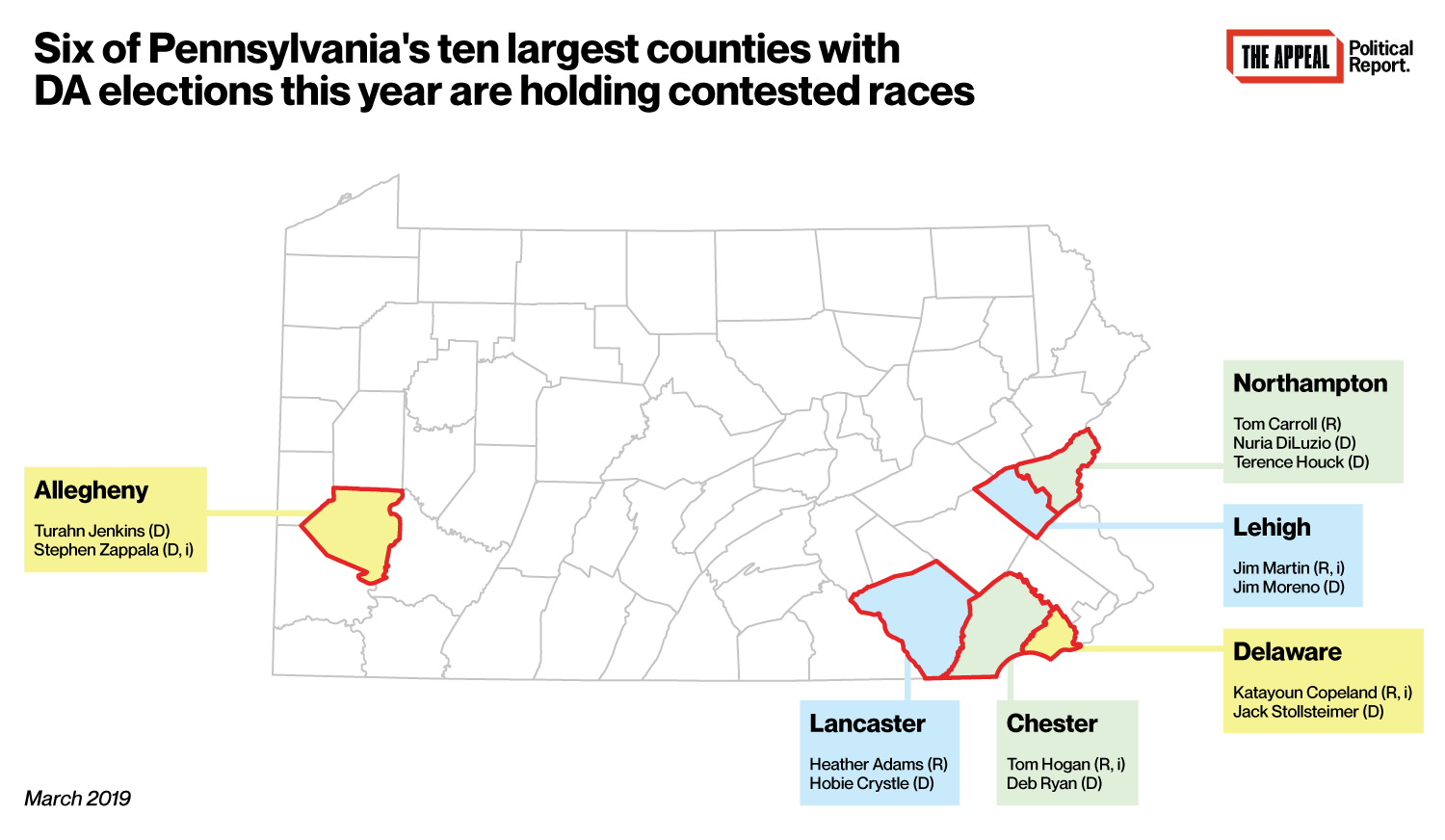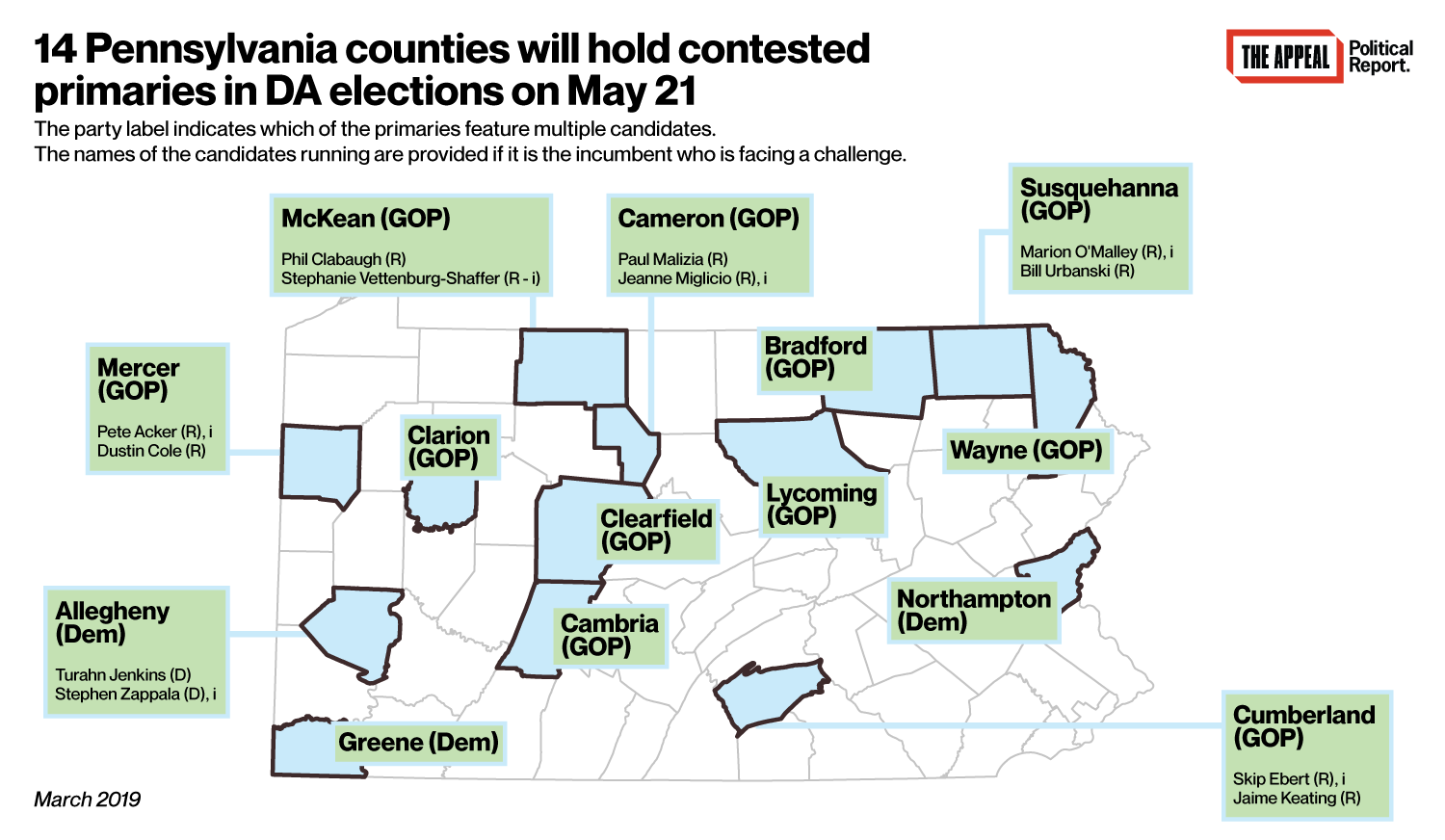Political Report
Stage Is Set for Pennsylvania's DA Elections: A Preview
Pennsylania has country’s second-highest rate of people under correctional control, and the 2019 DA elections provide opportunities for reform advocates.
This article is part of the Appeal: Political Report’s coverage of 2019 local elections.
Pennsylvania holds 49 district attorney elections this year. The state has the country’s second-highest rate of people under correctional control, and these elections provide opportunities for advocates of criminal justice reform to change that distinction. DAs enjoy direct discretion and indirect policy influence to shape the criminal legal system.
With the primaries looming in May, prospective candidates faced a March deadline to file as Democrats or Republicans. (Independents and third-party members can file until August.) The state provides no candidate database, an obstacle for these elections to get the attention they deserve. The Political Report has identified all the candidates in this masterlist.
But only 24 of these 49 elections features more than one major-party candidate. This effectively means that many incumbents already look likely to coast to re-election, including some in populous counties like Montgomery and Luzerne. That said, this is a higher rate of contested elections than many states had in 2018—far higher, in fact, than in Mississippi this year.
Six of the 10 largest counties that are voting for DA this year will have contested elections.

In addition, there will be contested primaries in at least 14 counties in May.

The Political Report will preview these races throughout this year. Below is an initial overview.
Pittsburgh DA draws first opponent since 1999: Stephen Zappala has faced no challenger in his past four re-election bids in Allegheny County, home to Pittsburgh. But Turahn Jenkins, then the county’s chief deputy public defender, announced in July that he would challenge Zappala in the Democratic primary, stating “our criminal justice system destroys people’s lives.” Zappala has long faced complaints over his handling of cases involving police officers, and over racial disparities in his office’s practices. Joshua Vaughn has reported in The Appeal that the majority of people charged with small-scale marijuana possession in the county are Black, and also that more than 80 percent of minors charged as adults by Zappala in 2016 and 2017 were Black.
The second-largest county to hold a contested election is Delaware County. Republican DA Katayoun Copeland will face Democrat Jack Stollsteimer, a deputy state treasurer involved in efforts to deprivatize a local prison as part of the Delco Coalition for Prison Reform.
Seven counties are sure to have a new DA: Incumbents are not running in seven counties. The largest is Northampton, where DA John Morganelli is known for his opposition to reform and hardline stances on immigration. The Political Report reviewed Morganelli’s record in January. Neither of the two Democrats who filed to replace him emphasized significant reforms in launching their candidacies, the Political Report found then.
Prosecuting overdoses as homicides: Many Pennsylvania DAs are responding to overdoses by charging the people who provided the drug with homicide: Death by drug delivery charges tripled between 2013 and 2018, according to a PennLive analysis. Public health advocates have denounced this approach as harmful. “There is little doubt that such charges allow prosecutors to score political points, but this is at enormous expense to the communities they serve,” Leo Beletsky, a professor of law and health sciences at Northeastern University, told me. He said that “every dollar spent on these failed punitive strategies is a dollar that could be spent on measures that work” such as “overdose prevention” and “improving access to treatment.” Two counties whose DAs have made aggressive use of this charge hold contested elections this year: Lancaster County’s Craig Stedman is retiring, so the county is sure to elect a new prosecutor, and Cumberland County’s Skip Ebert faces opponents in both the GOP primary and general election.
Other issues include whether candidates would seek the death penalty (whose use has declined among state prosecutors) and what their stances are toward statewide sentencing reforms.
Will the PDAA lose more members? Philadelphia DA Larry Krasner took the atypical step of quitting the state’s district attorneys association (PDAA), denouncing as regressive the policies it advocates. Although he is not up for re-election this year, he has something riding: Will he acquire an ally in developing a prosecutorial vision that contrasts with the PDAA’s? Turahn Jenkins, for one, told the Political Report in December that if he were to win in Allegheny County he would quit the PDAA “unless the organization demonstrates a willingness to reconsider their policy positions.”
Uncontested elections strike again: The Appeal has reported that the office of Adams County DA Brian Sinnett seldom files rape charges, and it has documented Franklin County DA Matthew Fogal’s practice of aggressively prosecuting people for failing to make rental payments or for low-level drug cases. Sinnett and Fogal are up for re-election this year—but no one has filed to run against either of them.
